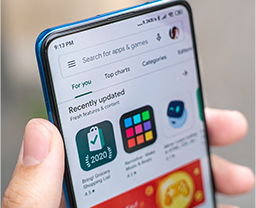
Search Engine Optimization

On-Page

Off-Page

Technical SEO

Local SEO

App Store Optimization
What Is Search Engine Optimization?
Search engine optimization (SEO) is a process that is predicated on improving your site’s visibility on search engines such as Google, Bing, and Yahoo when people search for products or services that are related to your business. The better your visibility, the more attention your organization gets, which directly correlates to prospects, who turn into leads, and eventually clients, which add to your existing customer base.
If you are wondering how this process works, search engines utilize bots, also known as “crawlers,” to crawl pages on the web going from site to site, indexing the information and putting it in a digital ranking system and library, so when you type in your search query, the search engine pulls up the page to best answer your question. It does not stop there. Algorithms come into play to analyze this information and factor in other variables or signals to assist in this ranking process.
The History Of SEO
While the date of SEO’s birth is disputed, many fixate to 1991, when the first website was launched. As one quickly turns into many websites, the Internet becomes crowded. With the crowding, search engines were created to help sort through the mess. The first search engine on the scene was Excite in 1993, but a year later Alta Vista and Yahoo joined the scene. Now, you might be wondering where Google comes into play? We’re getting there. In 1996, Sergey Brin and Larry Page began building the most recognized search engine called BackRub, which eventually became Google and was registered under that domain in 1997.
In these early stages, SEO rules were a version of the wild west so companies could use hacking practices, stuff keywords, and use spam links to rank even higher in search results. Google wanted to see this come to a close, so the company began working on algorithms that would reward quality and relevancy for connecting users with what mattered to them. Exactly what they were searching for. Since that point, hundreds of algorithm changes have been made, and some are being made as you read this page. These changes directly influence your SEO strategy and techniques.
Types Of SEO
On-Page
This is the most common and includes all of the things that your viewers see when they are reading your website. Your content must be informative, have the right keywords, have simplistic navigation, and be of the highest quality for this to be effective. When we say the highest quality, your page has to solve problems that other pages are not solving when customers enter a search query specific to you. To be successful on-page, you need to be focused on the user.
Off-Page
The most important aspect of this is link-building. You need links to your site that bring people to you, which will also show Google and others that your content is valuable and that you are an authority figure in the industry.
The next part is getting other sites that are authority figures in specific topics to link back to your site will give you a significant boost. However, this can be a challenge to obtain. Another way to gain off-page SEO is if people are sharing your content on social networks and building positive relationships with people who could share your content, such as bloggers, journalists, or people who have similar websites to yours.
Technical SEO
This ties into the fact that search engines will give preferences to sites that scale well to multiple devices have a fast page loading speed. Using schema markup to tell what is on your page will also help those crawlers figure out your page. Like your on-page SEO, the key is about providing a good user experience.
Local SEO
Although companies can primarily operate online, many still have a physical location where they need customers to come to them. The steps for this are ensuring your Google My Business Page is claimed, which must be optimized with good photos, information and reviews, adding regions or cities to your page titles, descriptions, keywords, and awards. These are other nuanced parts of this, but being relevant in your locale is essential.
App Store Optimization
Google or Yahoo aren't the only places where you need to rank as App Stores from Apple, and Google get a massive amount of traffic. If you have an app, you have to be looking into how you can leverage this. Your app title and icon have to be descriptive, attractive, and the description has to include keywords that mesh with your site, your app, and what your consumers are searching for.
YouTube SEO
Like your app store optimization, this is also niche. However, YouTube is incredibly popular. The same principles apply here. The video needs to be high quality, answer questions, solve your consumers' problems or be incredibly entertaining. Remember, likes, comments and subscribes will help you gain authority using this SEO. Then your title, description and tags have to be keyword rich to help Google understand what the video is about.
How Does Search Engine Help My Business?
Organic search is a significant part of your business’s website performance, boosting your credibility in a cost-effective manner, supporting the content you market, gives you a competitive advantage in your marketing, increasing your reach, helping you rank better in local searches and improving engagement rates when users come to your site.
At the end of the day, all businesses are looking for more business. SEO can help make that a reality for you. At LT3 ATG, we have specialists in SEO who will evaluate your current SEO strategy, the strengths and weaknesses associated with it and provide you with a plan to improve so you can continue to grow your business. Book your consultation today, and let’s get started!
Search Engine Optimization
Related Services
Related Articles
No related articles at the moment
Related Projects
Check out our other projects →LT3 ATG
Ready to get started?
Building your vision starts with a conversation. We're always happy to chat.














